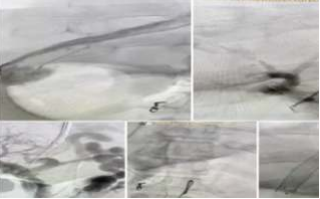A frequent complication in cirrhotic patients is variceal bleeding. The management of this type of bleeding can be done successfully with Rescue TIPS placement. We had a patient with chronic liver disease secondary to non-alcoholic steatohepatitis with variceal bleeding. Primary treatment was given with terlipressin and blood cells. Upper gastrointestinal endoscopy revealed active bleeding, as the glue therapy and Hemospray were unsuccessful. After a successful transjugular intrahepatic portosystemic shunt patient developed encephalopathy. All required treatment was implemented, and the patient was stable. This case study reveals that we can effectively perform complex procedures and improve patient outcomes and prognosis.
Case Report
A 55-year-old man with a history of chronic liver disease (CLD) secondary to non-alcoholic steatohepatitis (NASH) presented to the emergency department for hematemesis and hypotension. He had a pale tone and was tachycardic (130 bpm) and hypotensive (70/50 mmHg). According to the blood test, he was anemic (Hb: 3.2 g/dL). One day prior the patient was admitted to another hospital with the same complaints and underwent upper GI endoscopy and endoscopic variceal l igation ( EVL). After adequate hemodynamic resuscitation with blood cell and terlipressin, the patient underwent upper GI endoscopy which showed active spurting from the esophageal variceal bleeding site, which was not controlled by glue therapy and Hemospray, and the patient was referred for TIPS placement followed by a liver transplant.
After 3 hours all the necessary arrangements were done, and the patient underwent successful TIPS placement.Hepatic venous pressure gradient (HVPG) pressure decreased significantly, the patient was clinically stable, and had no further drop in hemoglobin. After some time, the patient landed into hepatic encephalopathy and started anti-encephalopathy measures, after which the patient was extubated on day 8. After day 15, the patient was out of encephalopathy and discharged. The patient is still in follow-up and doing great.

Conclusion
TIPS is a relatively safe and established procedure for the treatmentofcomplications related to portalhypertension like bleeding. As the procedure is complex and needs a clear understanding to avoid further procedure-related complications, this case report illustrates that we can effectively perform complex procedures and improve patientoutcomes and prognosis.
Contributors
Dr Tushar Sanklecha
HOD Gastroenterology
News Letter
Medicover Hospitals Impact Newsletter August 2022


